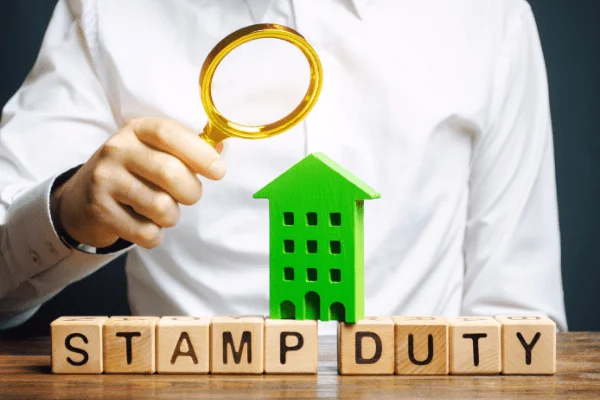News
Stamp Duty Savings Wiped Out by Skyrocketing Property Prices
The UK government’s temporary stamp duty holiday was supposed to boost buyer interest and motivate more first-time buyers to get on the property ladder. With potential savings of up to £15,000 available for those who took advantage of the scheme during its run,
New figures from MIAC Property Analytics suggest that across all areas of the country, these potential savings were completely wiped out by skyrocketing house prices. In real terms, buyers were still paying significantly more for homes than would have been the case a year ago, even when factoring in the maximum £15,000 saving.
House prices in the Northwest increased rapidly between June last year and April 2021, which is up approximately 3.68% despite an average £1,849 stamp duty saving. It was a similar picture in Yorkshire and the Humber, where average houses were up around 3.26% in April this year.
Home buyers in Westminster saw the biggest average property price increase anywhere in the UK. Comparing June 2020 to April 2021, average property prices were up an astonishing £138,316, even with the stamp duty savings factored in.
The average price of a terraced home in Westminster now stands at just under £4 million.
Outside London, the biggest average property price increase was recorded in Newport, Wales, and was approximately £60,000, including the £15,000 stamp duty discount.
An unintended consequence of stamp duty savings
The goal of the stamp duty incentive was to invigorate the housing market at a difficult time. Having succeeded in doing just that, it also had a major impact on property prices as demand skyrocketed in almost all regions of the UK.
“The stamp duty holiday was an initiative designed to reboot a property market that had effectively stagnated as the pandemic and lockdown measures delayed completions and made house viewings virtually impossible,” commented Darrel Welch, managing director at MIAC Analytics.
“One of the unintended consequences of the stamp duty holiday has been a gold rush to complete before the respective deadlines, with the unprecedented demand pushing up prices in return.”
“What this data shows is that a significant amount of the stamp duty savings made over the last year has simply been added to the cost of the sale, in some cases adding tens of thousands of pounds to a mortgage.”
“This data provides a snapshot of the holiday’s impact in real-time, but it will be at least six to twelve months down the line until we can understand the true impact. If house prices snap back to pre-pandemic trends, then thousands of people could be at risk of oversized mortgages and negative equity.”
Online Rental Scams on the up as Virtual Viewings become the Norm
Scammers advertising other people’s homes for rent online are subsequently cheating victims out of fraudulent deposits and rental fees. This is the warning of numerous estate agents in the UK who have noticed a surge in the number of fraudulent listings appearing online.
The scam is being fuelled by the growing popularity of virtual viewings, which have become the norm for prospective tenants across the country. People are signing contracts and paying deposits without ever visiting the respective property in person.
Consequently, fake advertisements for rental properties are appearing online that are convincingly copied from reputable websites. Typically listed on online marketplaces like Gumtree, the listings appear to be genuine and are practically indistinguishable from the real thing.
Prospective tenants are taken through the process in the normal way, exchanging messages with the letting agent and viewing the property online. But when the deposit and other arrangement fees have been paid, the letting agent and listing disappear.
Some of those who were victims of the con only discovered that they had been scammed on the day they attempted to move into the property. At this point, they found that the property was either already occupied or was being advertised for sale or rent by a different agent.
Estate agents have warned that the problem is becoming more widespread all the time and have urged local and national authorities to take action.
How to avoid falling victim to online rental scams
In the meantime, experts are advising prospective tenants to be on the lookout for signs of online rental scams. The listings published by fraudsters can be surprisingly convincing, though they can be distinguished from real listings upon careful inspection.
These are the most important warning signs to be on the lookout for when browsing rental listings online:
- Free listings on sites like Gumtree should always be scrutinised and approached with caution. While there are many legitimate listings on sites like these, they are also where most fraudulent listings appear.
- Where there are multiple listings for the same property: Often with slight discrepancies from one to the next, this is a red flag of fraudulent activity.
- A clear lack of professionalism in a listing is also indicative of a potential scam. Poorly worded ads with typos and bad grammar would not be published by a professional lettings agent.
- Impossibly low prices for premium properties in desirable areas are another common warning sign. Where a listing for a property seems too good to be true, it almost certainly is.
- A reputable lettings agent will never ask for any kind of upfront payment before the property has been viewed. Where money is requested up front, always decline.
- Pushy landlords and those who are reluctant to arrange in-person viewings of a property should also be avoided at all costs, irrespective of how convincing they may be.
Thankfully, the vast majority of online rental property listings are genuine, even on free ad sites like Gumtree. Nevertheless, it is important to know how to draw distinctions between a legitimate listing and an attempt to defraud you out of your money.
Dreams of Home Ownership Fading Fast for Younger Generations
The plight of young people with fading dreams of one day owning their own properties was recently laid bare in a BBC expose; the average UK property price has once again reached a new all-time high, and an entire generation is waking up to the fact that homeownership may be completely out of the question.
What is particularly striking is the way in which the issue is by no means confined to certain affluent areas of the country. The BBC makes it clear just how difficult and unaffordable things are becoming for would-be buyers all over the country.
Record property price growth in Wales
The BBC spoke to a 29-year-old classroom assistant and freelance writer from Gwynedd, who said that her region had been absolutely swamped by movers and buyers over the course of the pandemic.
“I’m just burying my head in the sand and praying the market might crash,” she said, in reference to Wales seeing the highest year-on-year average house price growth in the UK: an astonishing 11% since the same time last year.
“Even when Wales was closed [in lockdown] and we were staying home, it was still being flooded with tourists who didn’t respect the rules.”
“You can feel like where you live is just a playground. I’m hearing about houses being bought unseen and the prices in North Wales rising more than anywhere else in the UK.”
She went on to discuss the growing impossibility of purchasing even a modest home anywhere in the region due to the disparity between average wages and current property prices.
“I’ve got a friend who grew up in Abersoch, and there’s no way he could afford to live there now,” she told the BBC.
“It’s full of these incredible millionaires’ houses that are empty for most of the year. It’s really frustrating when people say, ‘You just need to work harder’. The average income in that area is not that high; you could work your arse off for years and never be able to afford a property.”
Where she lives, the average gross weekly income stands at around £479, which equates to an approximate annual salary of slightly less than £25,000. This isn’t nearly enough to pass even the initial stress tests of a major bank or lender.
Struggles in the Southwest
The BBC also spoke to 30-year-old Tamsyn Kelly from Cornwall:
“My plan was to make money in the city and go home and live in Cornwall eventually,” she explains.
“A few years ago, that seemed possible, but now there’s no way I could afford a property at home. If I went home, I’d have to register for a housing association property.”
“It doesn’t make any sense for my brother to try and get rental accommodation.”
“In Penzance, [homeowners] think, ‘Why rent it out when I could Airbnb?’ I think it’s becoming harder and harder for young people to stay in Cornwall; most of my friends there are still living with their parents, and we’re nearly 30. People aren’t able to get on with their lives and meet normal adult milestones.”
Somerset resident Sam Fawcett, 28, likewise stated that his chances of purchasing a property were practically non-existent even before the COVID-19 crisis began.
“Three new average-sized housing estates have gone up in the last five years, and another large one is just starting construction,” he told the BBC.
“But it doesn’t seem to have lowered house prices at all. In fact, my parents’ neighbours have just sold their house for £100,000 more than when they bought it four years ago.”
“The main thing I’ve noticed is how few properties are on the market at the moment.”
“There were periods over the last year when there were no properties at all to rent in the town or even a few miles into the surrounding area. Now there are six, but only three are within our price range. I know some of this must be because of COVID-19, but even in 2019, it was much harder than we thought it would be to find somewhere.”
How to Get a Good Deal on a Self-Employed Mortgage
Self-employed people are statistically more likely to be declined a mortgage than those who are traditionally employed. The vast majority of major banks and lenders impose additional restrictions on the self-employed that do not apply to those in conventional employment.
This does not mean it is impossible to qualify for a competitive mortgage while running your own business. Getting a good deal as a self-employed worker simply means approaching the right lenders and providing relevant evidence of your employment status and income.
Self-certification is no longer accepted
Previously, it was possible to self-certify your income as part of the mortgage application process. Where self-certification was an option, a lending decision could be reached based on the personal assurances of the applicant alone.
Today, lenders expect to see formal verification of income and financial status when considering applications from the self-employed.
This will typically mean providing:
- Certified accounts for at least two years
- Detailed evidence of earnings from HMRC
- Proof of your company’s track record
- Evidence of upcoming work or projects
This will need to be provided alongside all the usual documentation involved when applying for a mortgage, including but not limited to:
- Bank statements from at least the past six months
- Three months of utility bills
- Council tax bills
- Passports and/or driving licences
- Proof of current address and residency
- Maximum Loan Amounts for the Self-Employed
As a general rule of thumb, most mainstream banks will lend a maximum of 4.5 to 5 times the annual salary of the self-employed applicant. Though there is significant flexibility with maximum loan amounts depending on the lender in question and the financial circumstances of the applicant, In particular, offering a larger deposit can significantly increase the loan size available.
Getting a good deal as a self-employed worker
Mortgages for the self-employed can be extremely competitive, though they call for a strategic application process.
A few essential guidelines for self-employed mortgage applicants looking to get the best possible deal from a reputable lender are:
Apply via an established independent broker, who can conduct a whole market comparison on your behalf and find the perfect lender to suit your requirements. Taking your application directly to a lender is rarely the most cost-effective option.
Consult your credit score and note any discrepancies, as a history of credit issues could affect which lenders are willing to consider your application. If possible, take the time to address any issues with your credit that can be corrected before applying.
Hire an accountant to get your papers in order and to help you present a convincing case to prospective lenders. Accounts, statements, and paperwork prepared by a reputable accountant are always more authoritative when presented as part of an application.
Consider the alternative options to a conventional mortgage, which your broker will advise you on. For example, if you already have equity tied up in your current home or business property, a bridging loan could be a cost-effective option.
For more information on any of the above or to discuss any aspect of self-employed mortgages in more detail, book your obligation-free consultation with UK Property Finance today.
Are Lenders Unfairly Discriminating Against 5% Deposit Mortgage Applicants?
The return of the 95% LTV mortgage to the UK High Street came as welcome news for many thousands of first-time buyers. Ever since the financial crash almost 15 years ago, lenders have placed greater scrutiny than ever before on those they do business with.
Where an applicant is not clearly in a position to comfortably afford to repay a loan, rejection is guaranteed.
More recently, lenders have been urged to demonstrate greater flexibility where possible, both for the benefit of their applicants and for the wider economy, as the UK gradually climbs back to strength in the wake of the COVID-19 crisis.
With the 95% LTV mortgage back in business at a string of major lenders, it should be plain sailing for those unable to come up with a larger deposit.
What seems to be happening is actually quite the opposite; the idea of the 5% deposit mortgage is to enable more deserving and financially stable borrowers to get onto the property ladder. Instead, reports continue to emerge of mortgage applications being unfairly and immediately declined, despite the fact that the applicants in question can clearly afford a mortgage.
Excessive restrictions are enforced
Some brokers have said that despite the fact that 95% of LTV mortgages are government-approved, lenders are placing excessive and unfair restrictions on these loans. Unless the applicant in question has a 100% flawless credit score and is clearly sitting on a small fortune in personal wealth, they’re falling at the first hurdle.
And in doing so, I completely missed the idea of the government-backed 5% deposit mortgage initiative.
New-build properties are apparently completely out of contention for 95% LTV mortgages with the five biggest lenders in the UK. Even when people have held on to their jobs throughout the pandemic and built an outstanding track record financially, they are still being turned down routinely.
Experts believe it is simply a case of lenders attempting to cover themselves against what happened previously. Rather than assessing eligibility based on an applicant’s financial status today, they’re taking into account every possible scenario going forward.
A certain amount of due diligence in such regard is important, but the extent to which lenders are scrutinising applicants on the prospect that they might lose their jobs in the future is making the 95% LTV mortgage scheme considerably less accessible.
The importance of independent broker support
While such complications perpetuate, the importance of independent broker support will continue to grow. Brokers are gradually getting a feel for the 5% deposit mortgage landscape, along with the fact that lenders are actually taking 95% LTV loans seriously.
Taking an application directly to a major lender in the hopes of getting a mortgage with a 5% deposit is inadvisable.
To learn more about the government-backed mortgage scheme or to discuss your eligibility for a home loan in more detail, contact a member of the team at UK Property Finance today for an obligation-free consultation.
Crypto Withdraw Feature Coming to PayPal, Company Confirms
PayPal has confirmed that its customers will soon be able to transfer cryptocurrency from their accounts to external wallets for the first time. Currently, it is only possible for customers with crypto coins in their accounts to either hold onto them or spend them.
CoinDesk, Head of Blockchain Services for PayPal, Jose Fernandez da Ponte, confirmed that the service will be introduced at Consensus 2021, a conference organised and hosted by CoinDesk.
“We want to make it as open as possible, and we want to give choice to our consumers,” Jose confirmed for those in attendance.
“Same as we let them pay any way they want to pay, we want them to bring their crypto to us, so they use it in commerce, and we want them to take the crypto they acquire with us and take it to the destination of their choice.”
When quizzed as to the likelihood of PayPal introducing its stable coin sometime in the near future, Mr. da Ponte stated that it is “way too early” for this kind of move to be made. He also commented on expectations with regard to the rollout of central bank digital currencies, stating that “it absolutely makes sense that central banks will issue their own tokens.”
A long-awaited service expansion
PayPal officially entered the cryptocurrency game as recently as March this year, when it was confirmed that the company would begin letting customers in the US use crypto coins for payments.
Shortly after, PayPal announced that it would allow its customers to connect their accounts with their Coinbase-operated digital wallets, facilitated by the Venmo payment app.
“Crypto on Venmo is a new way for the Venmo community to start exploring the world of crypto within the Venmo environment they trust and rely on as a key component of their everyday financial lives,” commented Senior Vice President of PayPal and General Manager of Venmo, Darrell Esch.
“No matter where you are in your cryptocurrency journey, crypto on Venmo will help our community learn and explore cryptocurrencies on a trusted platform and directly in the app they know and love.”
“Our goal is to provide our customers with an easy-to-use platform that simplifies the process of buying and selling cryptocurrencies and demystifies some common questions and misconceptions that consumers may have.”
To Buy or Not to Buy! Property Experts Discuss Whether Buyers Should Buy Now or Wait Until 2022
This month, property prices rose once again, by £2,509, resulting in the average price of a home in the UK rising to an all-time high of £336,073. With the price increases and the end of the stamp duty tax break, many buyers are asking whether this is the time to buy or if it would be more prudent to wait until 2022.
The property market has been somewhat chaotic over the past few months, mostly due to the pandemic and the stamp duty holiday. However, there are early indications that the market is starting to slow down and normalise. The monthly house price index report by Rightmove showed a 0.8% rise in June, down from a much higher 1.8% increase seen in May. April showed an even bigger leap of 2.1%, according to the report.
Rocketing prices were attributed to the increased demand for properties during the stamp duty holiday as well as the extremely low-interest rates on offer. With the tax break coming to an end, demand has significantly decreased, and property prices are expected to stabilise.
On July 1st, the stamp duty threshold will change to £250,000, and from October 1st, it will return to £125,000.
Ask the experts
Experts give their professional opinion on whether now is the right time to buy or if it is better to hold off for now.
Moneyfacts’s finance expert, Rachel Springall, commented that the impact on first-time buyers and people looking to remortgage will be different. Remortgagers will find they have more equity than they had before, while first-time buyers will need to save larger deposits due to increased house prices.
She also explained how new homeowners may find themselves in negative equity if prices were to drop in the near future.
She explained: “If first-time buyers have a 5% deposit to get their foot onto the property ladder, then they will find deals returning to the market after a notable absence.
“However, whether it is the right time for them to commit must be considered carefully because house prices could fall and leave borrowers in negative equity.
“Borrowers who have a limited deposit or equity may wish to spend more time building a larger pot and wait a little longer before they commit to a mortgage.”
Rachel also advised that a larger deposit attracts lower interest rates when it comes to getting a mortgage. A two-year fixed-rate mortgage with a 10% deposit works out at 0.53% lower than the same mortgage with a 5% deposit.
She said, “Clearly, stretching to just 5% more could entail some substantial savings on mortgage repayments by moving down the next loan-to-value bracket.”
She added that she would advise caution when it came to considering sub-1% mortgages and to ensure to check all fees and any additional costs before committing. She left off by saying that it is really down to individual circumstances whether now is the time to buy or not.
Hargreaves Lansdown’s personal finance analyst, Sarah Coles, stated that she felt that house price drops in the short term were “not the end of the world” if you expect to live in the property over the long term. However, she advised buyers to be aware of bidding wars and to not pay more than they wanted to, in which case it may be better to wait.
Sarah added, “Likewise, it might make sense if you haven’t saved enough of a deposit to make the mortgage affordable or if you’re concerned about the immediate outlook for your job.
“But there similarly might be very good reasons to get on with it, especially if you’re living somewhere that’s making you or your family unhappy.”
Historic Global Tax Agreement Reached by G7 Finance Ministers
On June 5, G7 finance ministers reached a historic global tax reform agreement, fulfilling the promise of Chancellor Rishi Sunak to ensure the world’s biggest international businesses make an appropriate contribution.
Key details of the agreement reached at the G7 summit
- G7 Finance Ministers strike a seismic agreement on global tax reform that will mean the largest multinational tech giants will pay their fair share of tax in the countries in which they operate.
- Following two days of talks chaired by Chancellor Rishi Sunak in London, counterparts agreed to reforms that would see multinationals pay tax in the countries where they do business.
- As part of the landmark deal, finance ministers also agreed to the principle of a global minimum rate that ensures multinationals pay a tax of at least 15% in each country they operate in.
- Nations also agree to follow the UK’s lead in making climate reporting mandatory and agree on measures to crack down on the proceeds of environmental crimes.
Source: Gov. uk
At the culmination of several years of discussions, finance ministers from the G7 nations reached an agreement that will see major international companies face fair tax obligations in the countries in which they do business. It was also agreed that multinationals should pay a global minimum tax rate of at least 15% in every country they operate in.
Speaking after the event, Chancellor Rishi Sunak commented on the significance of the landmark agreement and its positive impact on the UK economy.
“These seismic tax reforms are something the UK has been pushing for and a huge prize for the British taxpayer, creating a fairer tax system fit for the 21st century,” he said.
“This is a truly historic agreement, and I’m proud the G7 has shown collective leadership at this crucial time in our global economic recovery.”
Further, focus on environmental issues
It was also agreed at the meeting that G7 leaders should follow in the footsteps of the UK by demonstrating genuine commitment to the integration of climate change prevention and biodiversity preservation in all aspects of financial and economic decision-making.
Since the creation of the Task Force on Climate-Related Financial Disclosures (TCFD) six years ago, the United Kingdom has played a major role in ushering G7 nations in a more proactive direction where major climate issues are concerned. Specifically, the UK has encouraged and inspired the G7 to make climate disclosures mandatory across their respective economies.
Support for vulnerable countries
G7 ministers also pledged to offer additional support to poor and vulnerable countries worldwide, furthering the group’s milestone backing of the $650 billion general allocation of Special Drawing Rights (SDRs) earlier this year.
Further details on the agreements reached and the meeting can be found on the official Gov. uk website, while images of the historic summit have been published on HM Treasury’s official Flickr page.








